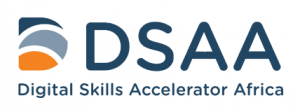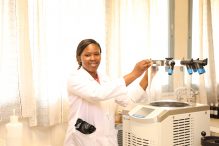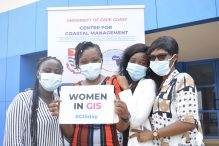Gambian Minister of Higher Education and Delegation visit ACE Impact Centre (KEEP) to Strengthen Existing Collaboration and Partnership
Gambian Minister of Higher Education and Delegation visit ACE Impact Centre (KEEP) to Strengthen Existing Collaboration and Partnership
The strong collaboration between the Gambian Ministry of Higher Education and the KNUST Engineering Education Project (KEEP) is a shining example of successful regional collaboration and one that the ACE Impact project promotes.
On June 1, 2021, honorable Badara A. Joof, the Minister of Higher Education, Research, Science and Technology (MoHERST) of The Gambia and a delegation from the Gambian Technical Training Institute (GTTI) visited the Kwame Nkrumah University of Science and Technology (KNUST), and the ACE Impact Center – KEEP, hosted by the KNUST in Ghana.
The KNUST Engineering Education Project (KEEP) has a collaboration with the GTTI and provides mentorship to help transform the technical Institute into a technical university, with the capacity to offer core engineering degree programs. The purpose of the meeting included strengthening collaboration between the two parties in the areas of offering short-courses, training, and mentorship of PhD students, enrolling mature students, training of MSc. students to serve as Research Assistants and Laboratory Technicians and to officially finalize the contractual agreement between GTTI and KNUST.
The Gambian delegation was received by the Vice-Chancellor of KNUST, Professor (Mrs.) Rita Akosua Dickson, who assured the team of the institution’s commitment to ensuring an effective collaboration and implementation of the key areas of the partnership. The team also took advantage of their presence in KNUST to interact with students from the Gambia (47 undergraduates, 10 PhDs and 2 Master’s students) who have been enrolled in the Department of Civil, Electrical and Electronic and Mechanical Engineering in KNUST.
Meeting with the AAU, University of Ghana, and the Ghana Tertiary Education Commission
The Regional Facilitation Unit of the ACE Impact Project, the Association of African Universities (AAU), facilitated meetings between the Gambian delegation and the University of Ghana, the Ghana Tertiary Education Commission (GTEC) and the AAU Team. In all three institutions the delegation was received by the heads of the institutions, – the Secretary General, Prof. Etienne Ehile of the AAU, the Vice – Chancellor, Prof. Ebenezer Oduro Owusu of the University of Ghana, and the Director-General of the Ghana Tertiary Education Commission (GTEC), Prof. Mohammed Salifu.
Key discussions at these meetings focused on the parties’ identifying key ways of strengthening existing collaboration between Ghana and the Gambia in Education. Prof. Badara Joof, the Gambian Minister of Education reiterated the Gambia’s high regard for higher education institutions in Ghana and generally the West Africa sub-region. He called on the institutions they visited (UG, AAU and GTEC) to help build Gambia’s capacity in quality assurance and other relevant areas to enable the country achieve excellence in their tertiary and higher education sector.
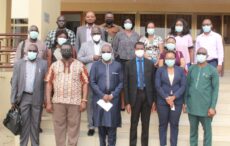
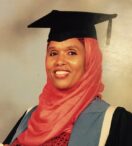


![A new and impactful online platform has launched to equip young African students with a repository to digitally house their credentials whilst directly connecting them to potential employers. The recruitment dashboard piloted under the Africa Centres of Excellence (ACE) Digital Skills Pilot Initiative provides a single platform for students/graduates and companies to match more efficiently, addressing the challenges of university- to-work transitions and improving recruitment practices in Africa. A first of its kind in Africa, this collaboration between the World Bank, the German Development Cooperation represented by Deutsche Gesellschaft für Internationale Zusammenarbeit (GIZ) GmbH and Digital Skills Accelerator Africa (DSAA) merges public and private sector engagement in a unique way, addressing Africa’s most pertinent issues, youth skills mismatch and youth unemployment. Through the ACE projects, the World Bank is providing funding to African universities to train their future workforce, whilst GIZ and DSAA connect international and African companies to training and hiring talented African students. The recruitment dashboard is being piloted in two ACE universities, Kwame Nkrumah University of Science and Technology (KNUST) in Ghana and Moi University in Kenya, with just under 200 undergraduate engineering and computer science students who have collectively completed more than 110 courses, receiving a total of 9,500 blockchain certificates through the platform. It allows students and recent graduates to create personalised profiles and upload their credentials online, that are fully accessible to multiple employers, thus significantly cutting down recruitment time and costs. IBM and FutureLearn provide access to over 150 free accredited courses to help students bridge the identified digital skills gap. Allowing for a seamless connection to recruiters, the dashboard provides a single space for companies to search and directly email potential recruits. “We have partnered with VerifyEd, a UK-based company, on this innovative platform to give recruiters easy access to a large pool of qualified and skilled potential workforce, whilst increasing student’s online visibility, giving them a competitive advantage”, says Halil Dundar, Practice Manager, Education Global Practice at the World Bank. “This investment has a great potential and supports Africa’s jobs and economic transformation agenda”. In the context of Invest for Jobs of the German Federal Ministry for Economic Cooperation and Development (BMZ), GIZ mobilises international and African companies through DSAA initiative. DSAA is an independent organisation focused on training highly skilled digital workforce talent in Africa, creating business opportunities for companies and individuals. Two member companies of DSAA, AmaliTech and getINNOtized, each with 300 vacancies in the 2021 calendar year, are participating in the recruitment dashboard pilot, providing a wide array of core digital skills- related job opportunities (both in-person and remote work) for the students. “We believe the ACE Recruitment Dashboard will augment our recruitment strategies to target graduates with IT, Computer Science, and Engineering backgrounds to join our AmaliTech Training Academy. This will enrich our pool of graduate recruits for free professional IT/digital skills training for employment pathways in the tech ecosystem.” Richard Botchway, AmaliTech’s HR Specialist (Diversity & Inclusion) says. The platforms filter functionality has been popular amongst recruiters. For Gideon Sackey, Dean of Students, getINNOtized: “Identifying the right candidate for the right job is always a hurdle for recruiters. This process is made simpler and efficient by the platform. The filtering features on the platform enable us to filter by skill, certifications, etc, saving time in our candidate selection process”. Jerry Kponyo, the Dean of Faculty at Kwame Nkrumah University of Science and Technology, one of the pilot universities, sees great potential and success of the recruitment dashboard: “Where recruiters are able to have access to such critical information [verified credentials], the students seeking employment would not have to struggle to communicate what they are capable of. The displayed certifications are self-advertising.” The World Bank, GIZ, DSAA and the various partners hope this initiative opens the doors for innovative use of blockchain technology in education on the continent; promotes a strong culture of micro-credentialing; creates an ecosystem promoting job opportunities for the African youth, as well as continued private and public collaboration. The results of the pilot are highly anticipated and will be key to the evolution of blockchain technology for the development of the African continent. About Invest for Jobs DSAA is supported by German Development Cooperation in the context of Invest for Jobs. Under the Invest for Jobs brand, the German Federal Ministry for Economic Cooperation and Development (BMZ) has put together a package of measures to support German, European and African companies in investment activities that have a high impact on employment in Africa. The Special Initiative on Training and Job Creation – the official title – offers comprehensive advice, contacts and financial support to overcome investment barriers. The development objective is to team up with companies to create good jobs and apprenticeships in the partner countries, of which there are currently eight, and to preserve them during the Covid-19 pandemic. Further information is available at www.invest-for-jobs.com About Africa Centers of Excellence Program The Africa Centers of Excellence (ACE) program is a series of regional higher education projects that aim to improve education, training and applied research at the post-graduate level in key priority fields, including science, technology, engineering, mathematics (STEM), agriculture, health, industry and related fields. The World Bank is supporting the overall ACE Digital Skills Pilot Initiative (launched in 2020) through a trust fund, the Korea-World Bank Partnership Facility. Further information is available at www.ace.aau.org](https://ace.aau.org/wp-content/uploads/2021/06/Picture1.jpg)

